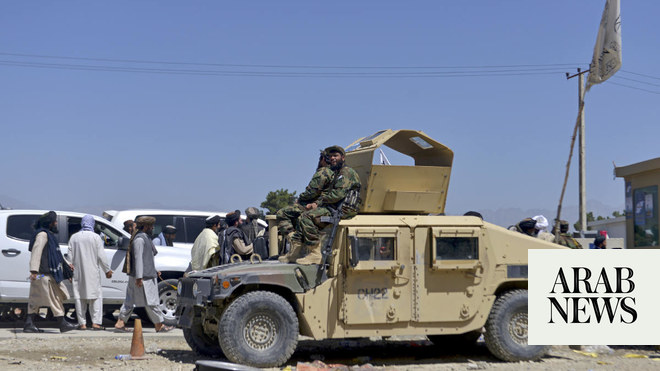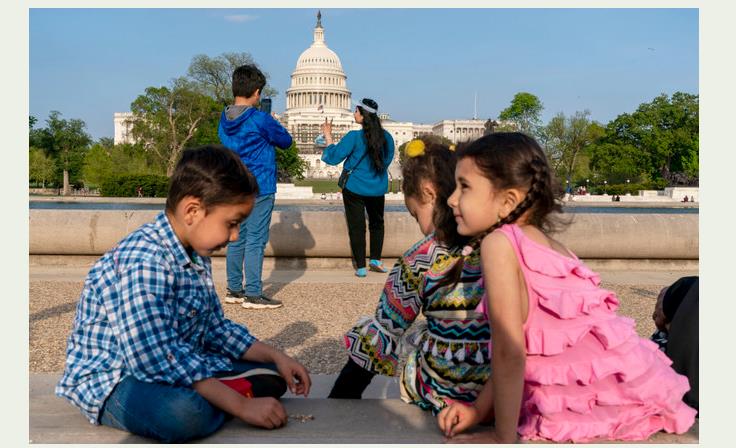
The fate of interpreters after the troop withdrawal is one of the looming uncertainties surrounding the withdrawal
Former interpreters becoming increasingly public about what they fear will happen should the Taliban return to power
KABUL: He served as an interpreter alongside US soldiers on hundreds of patrols and dozens of firefights in eastern Afghanistan, earning a glowing letter of recommendation from an American platoon commander and a medal of commendation.
Still, Ayazudin Hilal was turned down when he applied for one of the scarce special visas that would allow him to relocate to the US with his family. Now, as American and NATO forces prepare to leave the country, he and thousands of others who aided the war effort fear they will be left stranded, facing the prospect of Taliban reprisals.
“We are not safe,” the 41-year-old father of six said of Afghan civilians who worked for the US or NATO. “The Taliban is calling us and telling us, ‘Your stepbrother is leaving the country soon, and we will kill all of you guys.’”
The fate of interpreters after the troop withdrawal is one of the looming uncertainties surrounding the withdrawal, including a possible resurgence of terrorist threats and a reversal of fragile gains for women if chaos, whether from competing Kabul-based warlords or the Taliban, follows the end of America’s military engagement.
Interpreters and other civilians who worked for the US government or NATO can get what is known as a special immigrant visa, or SIV, under a program created in 2009 and modeled after a similar program for Iraqis.
Both SIV programs have long been dogged by complaints about a lengthy and complicated application process for security vetting that grew more cumbersome with pandemic safety measures.
US Secretary of State Antony Blinken told reporters last month that the US is committed to helping interpreters and other Afghan civilians who aided the war effort, often at great personal risk. The Biden administration has also launched a review of the SIV programs, examining the delays and the ability of applicants to challenge a rejection. It will also be adding anti-fraud measures.
Amid the review, former interpreters, who typically seek to shield their identities and keep a low profile, are becoming increasingly public about what they fear will happen should the Taliban return to power.
“They absolutely are going to kill us,” Mohammad Shoaib Walizada, a former interpreter for the US Army, said in an interview after joining others in a protest in Kabul.
At least 300 interpreters have been killed in Afghanistan since 2016, and the Taliban have made it clear they will continue to be targeted, said Matt Zeller, a co-founder of No One Left Behind, an organization that advocates on their behalf. He also served in the country as an Army officer.
“The Taliban considers them to be literally enemies of Islam,” said Zeller, now a fellow at the Truman National Security Project. “There’s no mercy for them.”
Members of Congress and former service members have also urged the US government to expedite the application process, which now typically takes more than three years. State Department spokesperson Ned Price said May 10 that the US Embassy in Kabul had temporarily increased staff to help process the visas.
In December, Congress added 4,000 visas, bringing the total number of Afghans who can come with their immediate family members to 26,500, with about half the allotted amount already used and about 18,000 applications pending.
Critics and refugee advocates said the need to relocate could swell dramatically if Afghanistan tumbles further into disarray. As it is, competing warlords financed and empowered by US and NATO forces threaten the future along with a resurgent Taliban, which have been able to make substantive territorial gains against a poorly trained and poorly equipped Afghan security force largely financed by US taxpayers.
“While I applaud the Biden administration’s review of the process, if they are not willing to sort of rethink the entire thing, they are not going to actually start helping those Afghans who are most at need,” said Noah Coburn, a political anthropologist whose research focuses on Afghanistan.
Coburn estimates there could be as many as 300,000 Afghan civilians who worked for the US or NATO in some form over the past two decades.
“There is a wide range of Afghans who would not be tolerated under the Taliban’s conception of what society should look like,” said Adam Bates, policy counsel for the International Refugee Assistance Project.












